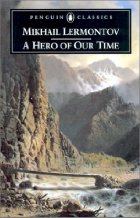
First published in 1840, Mikhail Lermontov artfully portrays what Michel Foucault nearly 130 years later articulates in the History of Sexuality, namely the role discourse plays in creating the object it sets out to study or understand. In A Hero of Our Time, the protagonist, Pechorin, finds himself at odds with the world. He is proud, energetic, strong-willed, and highly confident, but, finding that life does not measure up to his expectations, he becomes embittered, cynical, and bored. At the young age of 25, he has experienced all that life has to offer, and cannot find anything that rouses new interests. Life let him down. So he turns against life, embarking on petty adventures that may involve hurting feelings, killing friends and conniving against his own people. In the novel Pechorin's heart grows cold as he learns the ways of society. Early nineteenth century critics referred to figures like Pechorin as "superfluous men", men who are aware that they are above mediocrity of their society and aspire to something better, but they fail to achieve the high goals set by themselves, because social conditions may not provide the scope for them to realize their potential. While one can research the socio-historical background of the novel to understand why Pechorin becomes embittered and cynical, a psychological understanding is readily available in the text itself. In the following excerpt Pechorin records in his diary a number of childhood experiences that mold him into the cynical figure we encounter throughout the novel, and which also fall in line with Foucault's argument that discourse creates the object it sets out to understand:
Yes, that's been my lot ever since I was a boy. Everyone saw in my face evil traits that I didn't possess. But they assumed I did, and so they developed. I was modest, and was accused of being deceitful. so I kept to myself. I had strong sense of good and evil; instead of kindness I received nothing but insults, so I grew resentful. I was sullen, while other children were gay and talkative. I felt superior to them, and was set beneath them, so I became jealous. I was ready to love the world, but no one understood me, so I learned to hate. I spent my blighted youth in conflict with myself and the world. Fearing ridicule, I hid my best feelings deep within me, and there they died. I spoke the truth, but no one believed me, so I took to deceit. Knowing the world and the mainsprings of society, I became adept at the art of living...That led me to despair, not the despair you can cure with a pistol, but a cold, impotent despair that hid behind an affable exterior and a genial smile. I became a moral cripple.
The above passage brightly illumines the molding of the text's main character, Pechorin. Pechorin's progression from modest to deceitful, good sensed to resentful, gay to sullen only develops as members of society view him has having those characteristics. According to Michel Foucault, The mechanism by which this works involves an internalized perception or understanding of others. As one internalizes a perception of other individuals, one also internalizes categories into which different individuals can be placed, based on particular characteristics. Once these understandings have been internalized, one then treats others according to this understanding. In Pechorin's case, members of his own society believed they understood him to be of one type, ultimately treating him according to their categorized understanding. By doing so, they forced him to become what they understood him to be. In Pechorin's case there was no other choice, but to become a "superfluous man".
This insight into societies role in molding its own members might have been thoroughly understood around the time Lermontov wrote this piece. But no author has captured the essence, inevitability, and impact of such conditions of this time in the form of narration, journal entries and first hand accounts, like Mikhail Lermontov. As an added bonus the reader learns of the more-than-100 years relationship between Russia and the Caucasus, a relationship, which sheds light on the recent conflict that played out on the international stage at the end of this past summer.
-O. James
© Orin James 2008